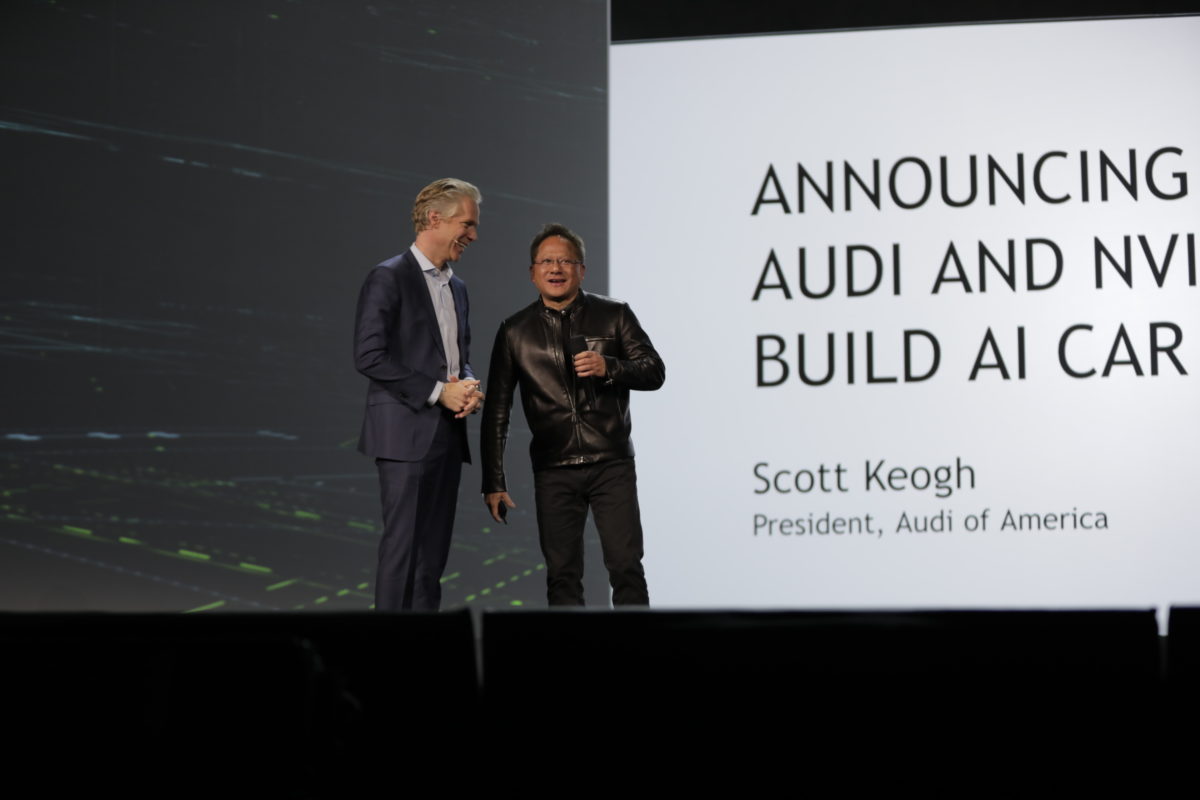 EMERGING TECH
EMERGING TECH
 EMERGING TECH
EMERGING TECH
 EMERGING TECH
EMERGING TECH
When most people think about Nvidia Corp., they likely think of graphics cards, or maybe its newer foray into artificial intelligence. That could soon change as the chip maker this week jumped much deeper than ever before into powering self-driving cars.
Nvidia on Wednesday night at the Consumer Electronics Show in Las Vegas announced that not only has it designed an artificially intelligence self-driving car platform but also signed an agreement with Audi AG to develop a vehicle ready for the road by 2020. Both Audi and Nvidia, which have worked together previously on in-car technology, are aiming for that vehicle to be a “Level 4” automatic vehicle, a car capable of driving entirely on its own without any human intervention.
Although the promise of a Nvidia powered self-driving Audi is still a few years off, the companies have been busy none the less coming into CES with an Audi Q7 piloted driving concept vehicle on display. The vehicle, which allows passengers to ride in the back seat with no one behind the wheel, is fitted with Nvidia’s DRIVE PX 2 autonomous driving platform running Nvidia PilotNet, software designed to recognize and understand the changing environment around the vehicle.
Nvidia Chief Executive Officer Jen-Hsun Huang (above right) told the audience at the company’s keynote presentation at CES that the concept self-driving vehicle demonstrated that the technology was “not end of this year, not end of next year [but] right now.”
In addition to the partnership with Audi, Nvidia also announced new deals with automotive parts suppliers ZF Friedrichshafen AG and Robert Bosch GmbH. ZF has announced the ZF ProAI self-driving system, based on the Nvidia DRIVE PX 2 AI car computer, for cars, trucks and other commercial vehicles for factories, agriculture and mining.
According to the company, the platform uses the DRIVE PX 2 AutoCruise configuration to enable companies to build self-driving vehicles, ranging from cars and trucks to industrial applications, such as forklifts and materials handling vehicles.
The deal with Bosch will see the companies collaborate to develop AI self-driving computers for production cars. The computers will use Nvidia’s technology combined with software that integrates Bosch radar and other sensors.
Nvidia clearly hopes its serious expansion into self-driving cars will provide massive growth potential in the years ahead in a nascent market that has the potential to reshape the world as we know it. “We are going through unquestionably the most exciting time in the computer industry that we’ve ever experienced,” Huang said during his keynote.
Support our mission to keep content open and free by engaging with theCUBE community. Join theCUBE’s Alumni Trust Network, where technology leaders connect, share intelligence and create opportunities.
Founded by tech visionaries John Furrier and Dave Vellante, SiliconANGLE Media has built a dynamic ecosystem of industry-leading digital media brands that reach 15+ million elite tech professionals. Our new proprietary theCUBE AI Video Cloud is breaking ground in audience interaction, leveraging theCUBEai.com neural network to help technology companies make data-driven decisions and stay at the forefront of industry conversations.